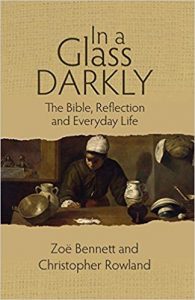In a Glass Darkly: The Bible, Reflection and Everyday Life
Zoe Bennett, Christopher Rowland SCM Press £25
(978-0-334-05422-1)
Moments of honesty and candour can be both refreshing and threatening in equal measure. I recently heard an intelligent and energetic parish priest make a passionate plea for Christians to be more honest about change and decline in organised religious life. The question and challenge was put so positively it was difficult to hear the plea as anything else but creative.
There are a number of fundamental theological questions associated with our understanding of contemporary religious experience and practice. This book, by a practical theologian and biblical scholar, reminds its reader of the importance of implementing and practising the fruits of decades of critical reflection on the Bible. We are reminded of the effects of a distorted handling of sacred texts, which lead to inhuman behaviour and broken lives. Religion has as much potential for harm as it has for good.
A further theme embodied here continues to illuminate and stimulate our spiritual curiosity. Art, poetry and music have the power to enable us to understand our human endeavours and give expression to our hopes and fears, our longings and vulnerabilities. In this book Bennett takes John Ruskin and Rowland William Blake and uses the poet and artists experience to dig deeper into their mutual journey of self-discovery as theologians. It is a journey of self-discovery and mutual learning.
The Bible is a core foundation in the Christian life and the chapters of this book model how we might read the Bible in such a way that holds together in creative dialogue with experience of life within our particular context. We see in process of reflection in this book how tradition and experience are inextricably intertwined.
In this commitment to a search for self-discovery and theological truth, we need to be aware of the limitations of tradition and critical of our own seeing and knowing. In this self-awareness both authors continue to demonstrate how we might find in Scripture life, wholeness and salvation.
This wisdom is achieved in and through the authors’ dialogue and reflected creatively in these chapters. There is challenge and a constant demand that we examine our assumptions in the nurture and practice of faith. Criticism, self-examination and a preparedness to be unsettled is a central theme as the text takes seriously Socrates, “For a human being the unexamined life is not worth living.” The reader will need to engage both head and heart to stimulate what might be described as a creativity of suspicion.
The starting point is the revelation of St John. We acknowledge the reality of this present world and express our longing for it to be different. The conviction that the present age has never more been in need of the Christian faith runs throughout the reflective contours of these reflections. What might it mean to celebrate the reality that the present order is passing away and a new order breaking in? What kind of church and religious practice might support this radical transformation? Feminism, liberation theology and a shared commitment to put theology to work shapes the quality of each chapter. Theory and practice must be held together if we are to discover a way of embracing exile. We also need Scripture to help us understand the delusions and corruptions of modern society. Reflexivity is part, a crucial part of our discipleship. This is hard work but hopeful work. It is in the words of St Paul (taken as the title) this is to see in a glass darkly.
Some of theology has become far too fragmented. Scholars and practioners need to model the process of dialogue modelled here. Theologians working across their academic specialisms of philosophy, hermeneutics, systematics, history and practical theology would do well to find a conversation partner and to see what emerges through friendship within intellectual endeavour.
This book will certainly find its way into reading lists here at Sarum College despite its cost – a gentle plea to the publishers to enable accessibility to such good practical theology!
James Woodward
Sarum College and The University of Winchester

